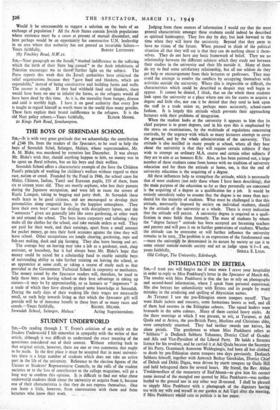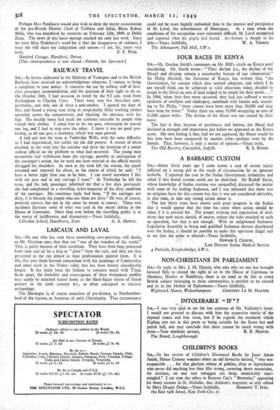INTIMIDATION IN ERITREA
Sta,—I trust you will forgive me if once more I crave your hospitality in order to reply to Miss Pankhurst's letter in the Spectator of March 4th.
The trouble with Miss Pankhurst is that she has to rely on photographs and second-hand information, where I speak from personal experience. She also betrays her unfamiliarity with Eritrea and its people by many mistakes in the rendering and spelling of Abyssinian names.
At Teramni I saw the pro-Ethiopian storm troopers myself. They wore khaki jackets and trousers, some formations berets as well, and all of them had rosettes in the Ethiopian colours. The squad leaders wore brassards in the same colours. Many of them carried heavy sticks. At the three meetings at which I was present, to wit, at Teramni, at Adi Quala and at Arresa, the pro-British Party, Muslims and Christians alike, were completely unarmed. They had neither swords nor knives, let alone pistols. The gentleman to whom Miss Pankhurst refers as " Sebhatu " is Dedjatch Sebhatu Yohannes, District Chief of Gundet and Aila and Vice-President of the Liberal Party. He holds a firearms licence for his revolver, and he carried it at Adi Quala because the Secretary of his Party, Grazmatch Asmerom Weldegiorgis, had been all but clubbed to death by pro-Ethiopian storm troopers two days previously. Dedjatch Sebhatu himself, together with Azmatch Berhay Gerekidan, District Chief of Debub and Dekki Digna, were driven by storm troopers up Guila Hill and held beleagured there for several hours. My friend, the Rev. Abbot Twoldemedhen of the monastery of End'Abona—to give him his correct name instead of the mangled one quoted by Miss Pankhurst—was neither hurled to the ground nor in any other way ill-treated. I shall be pleased to -supply Miss Pankhurst with a photograph of the dignitary having tea with my wife and myself in our garden at Adi Ugri after the meeting, if Miss Pankhurst would care to publish it in her paper.
Perhaps Miss Pankhurst would also wish to deny the recent assassination of the pro-British District Chief of Tzellima and Sefak Blatta Kahsai Maki, who was murdered by terrorists on February 12th, 1949, at Dekki Zuna. The news of this latest outrage reached me only last week. Since we have Miss Pankhurst's word'for it that she disapproves of violence, I trust she will share my indignation and sorrow.—I am, Sir, yours very truly, E. F. WISE. Hanford Cottage, Blandford, Dorset.
[This correspondence is now closed.—EDrrott, the Spectator.]







































 Previous page
Previous page